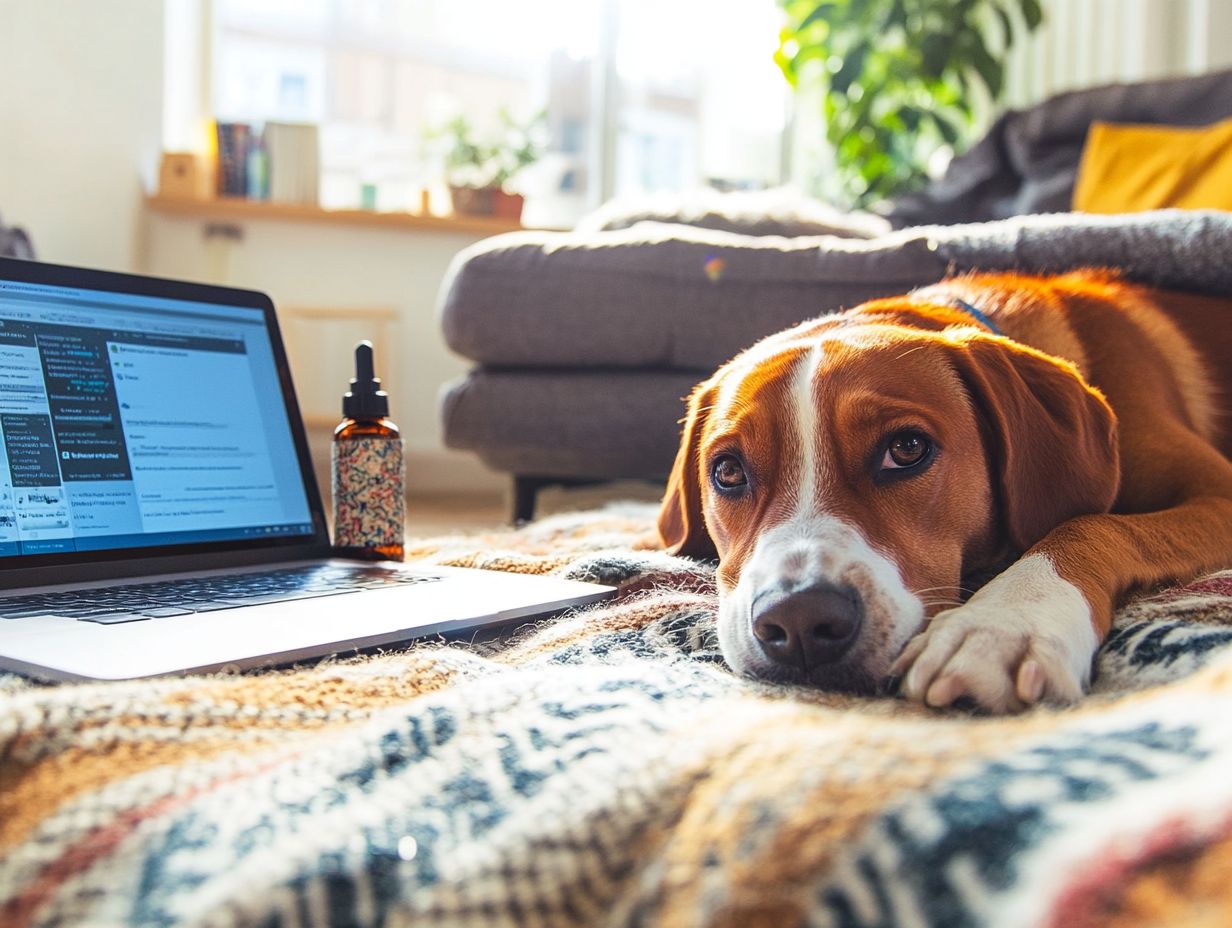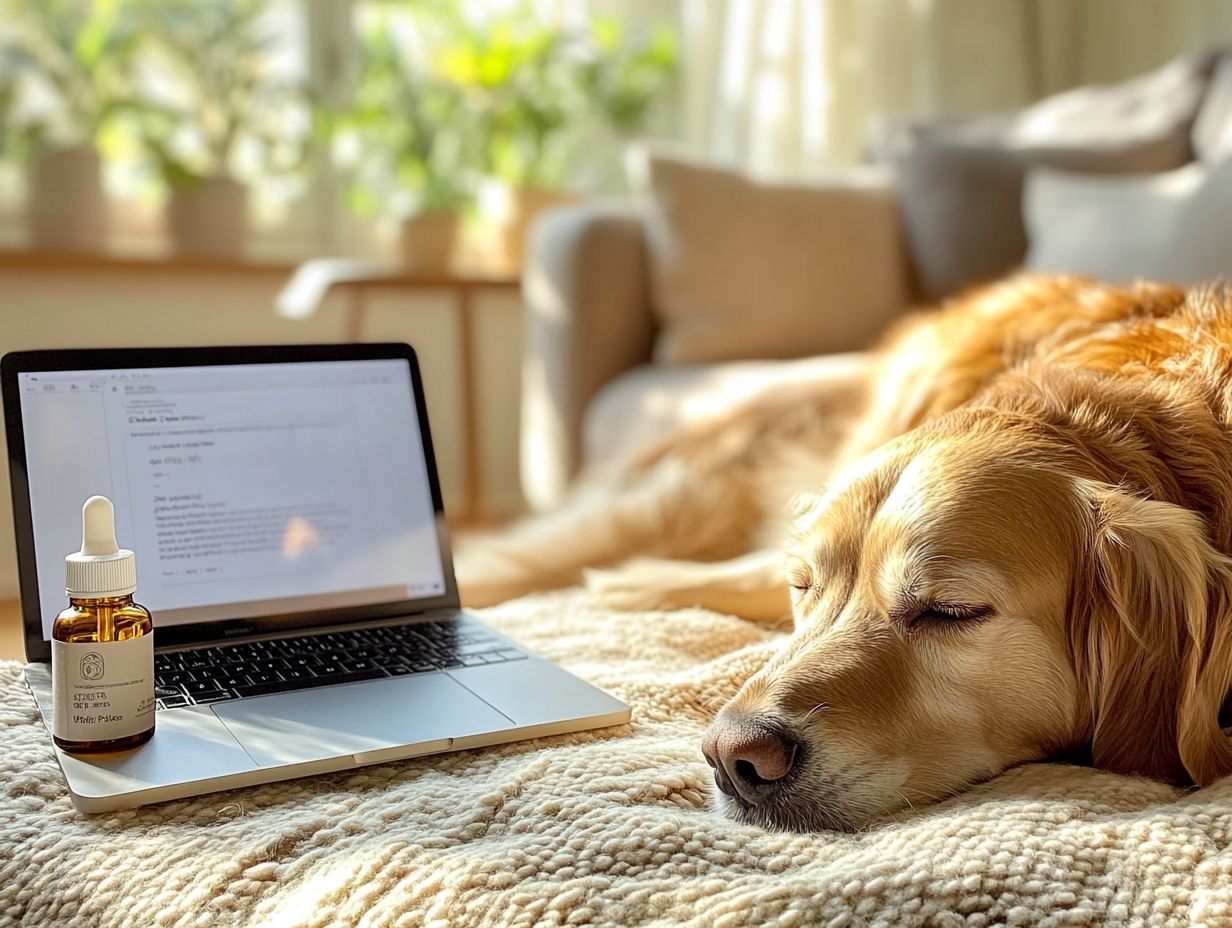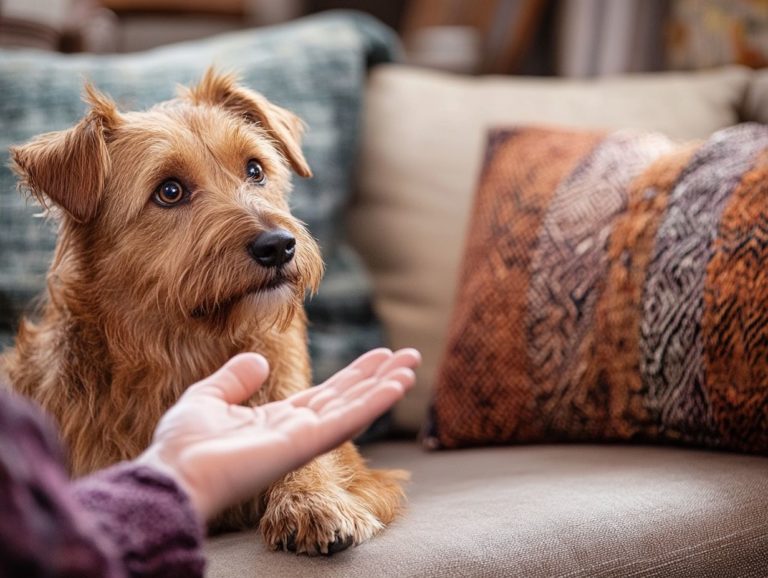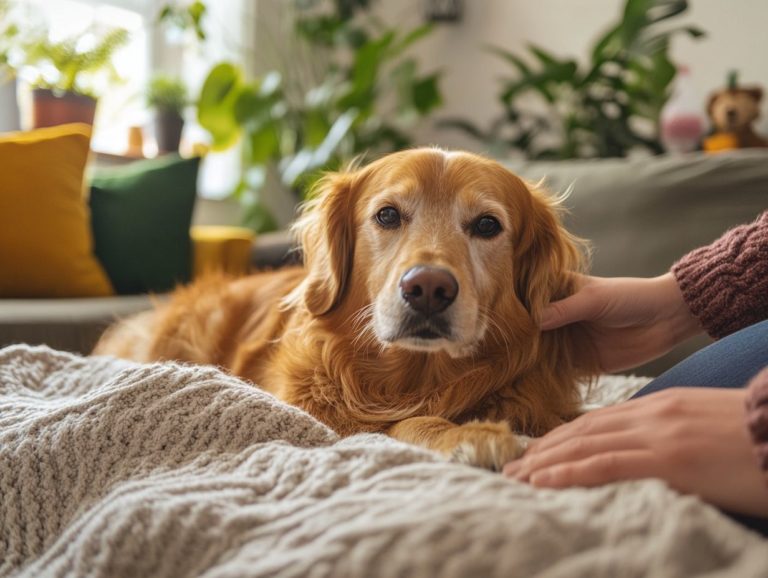Are There Online Resources for Pet Anxiety Help?
Every pet owner desires nothing more than a happy and healthy furry companion, yet many pets experience anxiety similar to what humans face. It’s important to understand what causes your pet’s anxiety.
This article delves into how you can identify behavioral and physical signs of anxiety, along with useful online resources for support and effective at-home strategies to manage their stress. It also explains when to seek professional help. Start your journey to a happier pet today!
Contents
Key Takeaways:

- Pet anxiety is a real issue caused by factors such as separation from owners, loud noises, and changes in routine.
- Common signs of pet anxiety include excessive panting, destructive behavior, and decreased appetite.
- Online resources like websites, apps, virtual counseling, and support groups can provide valuable help for pet owners dealing with anxiety in their pets.
Understanding Pet Anxiety
Understanding pet anxiety is essential for any caring pet owner who wishes to support their anxious dogs effectively. Anxiety can present itself in various forms, including separation anxiety, noise aversion during thunderstorms or fireworks, and emotional distress.
Recognizing the signs of anxiety and grasping the underlying causes is vital for effective management. This knowledge enables you to provide appropriate support and guides you in seeking professional help when needed.
By identifying anxiety triggers and symptoms, you can create a safe haven for your pet and employ calming techniques to enhance their emotional well-being.
Causes and Triggers
Understanding the causes and triggers of anxiety in dogs is essential for effective intervention. Factors like separation anxiety, past trauma, and environmental changes can significantly contribute to anxious behavior.
Dogs may show fear when faced with certain stimuli, such as loud noises or unfamiliar places, leading to emotional distress. By identifying these triggers, you can take preventative measures and develop training protocols to help build emotional self-control in your furry companion.
For example, noise aversion often stems from a dog s early experiences with thunderstorms or fireworks, leaving a lasting impact. Similarly, prolonged separation can trigger feelings of unease, resulting in destructive behaviors or incessant barking. Environmental factors like moving to a new home or changes in routine can amplify these anxieties.
Acknowledging the roots of these behaviors is crucial. Using positive reinforcement rewarding good behavior to encourage your pet can significantly help redirect your dog s focus and strengthen their sense of security. This approach fosters trust between you and your pet, encouraging a more relaxed demeanor over time.
Signs and Symptoms of Pet Anxiety
Recognizing the signs and symptoms of pet anxiety is crucial for responsible pet ownership. Behavioral indicators can range from excessive barking and destructive antics to more subtle cues like shifts in body language and communication styles.
You might also notice physical symptoms such as panting, trembling, or hiding, all of which signal that your dog is feeling anxious. Understanding these signs allows you to identify problem behaviors early, enabling you to take the right steps to soothe your anxious canine and enhance their emotional well-being.
By being attentive to your dog’s feelings, you can cultivate a supportive environment tailored to their needs.
Behavioral and Physical Indicators

Behavioral and physical indicators of anxiety in dogs can show in various ways. You might notice signs like excessive barking, whining, destructive chewing, or inappropriate urination.
Anxious dogs may tremble, pant, or avoid eye contact. These signs indicate emotional distress, so it’s essential to recognize them.
If your dog becomes excessively clingy and follows you everywhere, it may indicate separation anxiety. For example, a Golden Retriever chewed furniture due to a fear of thunderstorms.
Recognizing these behaviors helps understand your dog’s emotional state. Early intervention is vital for their well-being.
Consider strategies like desensitization training, which means gradually getting your dog used to things they fear, or creating a safe space to enhance your pet’s environment.
Online Resources for Pet Anxiety Help
In the digital realm, you ll discover a treasure trove of resources tailored just for you! Your pet’s happiness is just a click away. The AKC GoodDog Helpline stands ready to provide expert advice and guidance on a range of behavioral issues.
Explore online courses that deliver invaluable insights into training your puppy and managing anxious behaviors. Additionally, consider whether professional training can help with pet anxiety. Virtual counseling and support groups foster connections within a community of fellow pet owners, allowing you to share experiences and effective strategies for stress management.
Many websites provide tips on calming products and techniques, including the benefits of online consultations for pet anxiety, simplifying your search for effective solutions to help your anxious pets find peace.
Websites and Apps for Pet Owners
Websites and apps designed for pet owners are truly invaluable when it comes to managing dog anxiety and creating a supportive community. Many of these platforms offer a wealth of resources for training your puppy, including natural remedies for pet anxiety, as well as expert advice on obedience and emotional well-being.
Among the most popular options, platforms like Doggy Dan and PetMD truly shine with their interactive training videos and expert articles that tackle common behavioral issues. These resources not only enhance your dog s skills but also recommend calming products, such as pheromone diffusers and anxiety wraps.
User testimonials reveal the transformative power of these solutions, sharing stories of previously anxious dogs discovering comfort and peace through tailored strategies. Consultation services available through apps like Pupford connect you directly with trainers, offering personalized advice that caters specifically to your pet’s unique needs.
Virtual Counseling and Support Groups
Virtual counseling and support groups serve as helpful tools for you as a pet owner navigating the complexities of dog anxiety. These platforms create a friendly atmosphere for you to connect, share your experiences, and offer emotional support to one another, while also learning about best practices for pet anxiety training.
Many online groups specifically focus on anxiety management, providing you with tips, strategies, and coping mechanisms tailored for anxious behavior in pets. If you’re wondering if pet anxiety can be managed at home, engaging with a community of like-minded pet owners not only validates your feelings but also offers encouragement, leading to improved outcomes for both you and your furry friend.
Given that anxiety in dogs can often make you feel isolated, these virtual communities become essential lifelines for those seeking guidance and solidarity. Popular platforms like Pet Anxiety Support and The Dog Anxiety Network provide a wealth of resources, including how to find peer support for pet anxiety issues from veterinarians and trainers.
These groups create a friendly atmosphere while sharing success stories that can inspire you as you tackle similar challenges.
Having a supportive network can significantly reduce feelings of helplessness, enabling you to actively engage in your dog s emotional well-being. By implementing shared strategies and receiving ongoing encouragement, you can make meaningful strides in managing your pet’s anxiety.
Tips for Managing Pet Anxiety

Managing your pet s anxiety calls for a well-rounded approach that blends training tips with at-home techniques and emotional self-control practices. You can implement a variety of strategies to help calm your anxious dog and alleviate their stress.
Techniques like desensitization (gradually exposing your pet to what scares them in a safe way), relaxation exercises, and establishing a safe space for your furry friend can significantly enhance their emotional well-being. Integrate calming games and mental activities into your daily routine to help your anxious pet.
At-Home Techniques and Strategies
At-home techniques and strategies can significantly enhance your ability to manage pet anxiety effectively. Consider creating a calming environment using soothing music or essential oils, which can work wonders in alleviating stress. To learn more, explore whether pet anxiety can be treated effectively. Relaxation techniques, such as deep breathing exercises, can enable your pet to achieve emotional self-control.
Engaging in calming games and providing mentally stimulating toys can offer much-needed distraction for anxious dogs, helping to reduce problem behaviors tied to anxiety. A regular routine can help your dog feel secure, gradually easing their anxiety over time.
You might also explore interactive toys that dispense treats, providing a rewarding distraction during those stressful moments. Activities like puzzle toys or hide-and-seek games will encourage critical thinking, effectively shifting your pet’s focus away from anxiety triggers.
Incorporating short, positive training sessions into your daily routine can boost your dog’s confidence and strengthen your bond, offering mental stimulation and a satisfying sense of accomplishment.
Adjusting your home environment by creating cozy, quiet spaces furnished with soft bedding and familiar items can significantly enhance your pet’s sense of safety and relaxation. This approach ultimately promotes improved emotional well-being for your furry companion.
When to Seek Professional Help
Recognizing when to seek professional help for pet anxiety is crucial for the well-being of both you and your dog. Don t wait! If your dog s anxious behavior is intensifying or if self-help strategies are falling flat, it might be time to consult a veterinarian or an animal behaviorist for a thorough evaluation of your pet’s anxiety.
In more severe cases, specialized training from dog trainers or even anxiety medication may be required to provide the necessary relief. By understanding the severity of anxiety symptoms and knowing when to turn to professionals, you can pave the way for more positive outcomes for your anxious pet.
Identifying Severe Cases and Seeking Treatment
Identifying severe cases of pet anxiety is essential for ensuring timely and effective treatment. Signs like intense fear reactions, persistent destructive behavior, and significant withdrawal indicate that your dog’s anxiety may need professional help.
A thorough anxiety assessment by a veterinarian can uncover the root causes of these extreme behaviors. This assessment guides you toward appropriate treatment options, which might include anxiety medication or specialized training from experienced dog trainers.
Seeking timely intervention dramatically enhances the quality of life for both your anxious pet and yourself. For example, if your dog shows intense fear during thunderstorms, a combination of anti-anxiety medications and a training program to change behavior could make a world of difference.
During veterinary consultations, expect a comprehensive discussion about your pet’s symptoms and potential triggers. You’ll receive personalized recommendations tailored to your dog’s needs.
Many veterinarians collaborate with certified trainers who specialize in anxiety management. This creates a holistic approach that incorporates desensitization techniques methods that gradually reduce fear and positive reinforcement.
This multifaceted strategy aims to alleviate anxiety and equips you with the tools to manage your dog’s behavior long-term. This fosters a more harmonious household for everyone involved.
Frequently Asked Questions

Understanding pet anxiety is crucial for ensuring your furry friend lives a happy life. Here are some common questions pet owners have about anxiety in pets.
What is pet anxiety and how can I tell if my pet has it?
Pet anxiety is a psychological condition where pets experience fear, stress, and unease. Signs can include excessive barking or meowing, destructive behavior, changes in appetite, and hiding or avoiding interaction.
If you notice these behaviors, don’t wait! Reach out to a veterinarian for a proper diagnosis.
Are there any online resources for pet anxiety help?
Yes, many online resources offer help for pet anxiety. For instance, you can explore resources available for learning about pet anxiety, which include websites, forums, and support groups providing information, tips, and advice.
How can online resources help my pet with anxiety?
Online resources offer valuable information and support for pet owners, including finding resources after a pet anxiety consultation. They can provide tips on behavior modification, relaxation techniques, and natural remedies.
Some resources also connect you with trained professionals for personalized help.
Can online resources replace professional help for pet anxiety?
No, online resources should not replace professional help. While they can be a helpful supplement, it’s essential to consult a veterinarian or animal behaviorist for a proper diagnosis and treatment plan.
Are there any free online resources for pet anxiety help?
Yes! Many free online resources are available. Some websites and support groups offer services for free, while others may provide a trial period before requiring a paid subscription.
Research and compare different online resources to find the best fit for you and your pet’s needs.
Take the first step today toward a happier, calmer pet!






